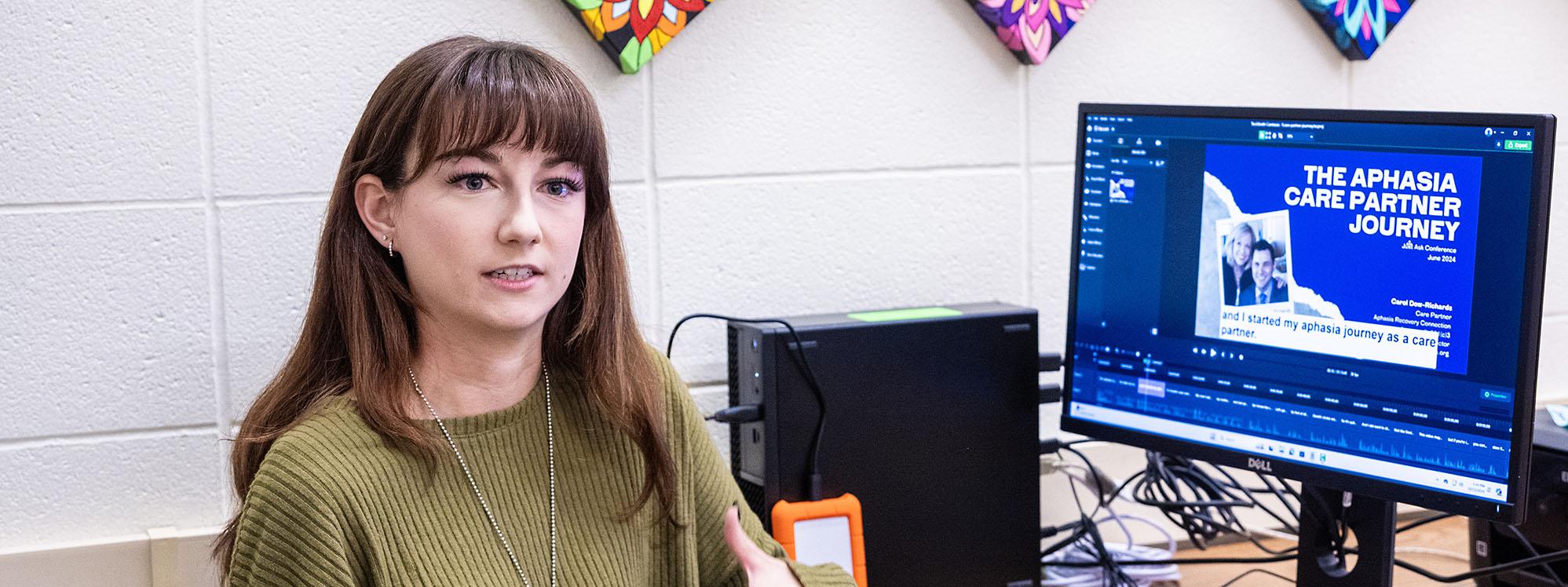
Student helping make videos more accessible for those with aphasia
By Blake Sebring
November 19, 2024
Purdue University Fort Wayne student Tori Perna says she decided to major in communication sciences and disorders as a coincidence, but every day that decision is turning into a lifetime passion.
While serving as a research assistant for Naomi Gurevich, associate professor in CSD, Perna is helping people dealing with aphasia, a disorder caused by damage to the language centers in the brain that affects expressing and understanding written and spoken language. Under Gurevich’s direction, Perna is working on a project to render videos more accessible for people with aphasia.
Gurevich initiated the project after attending an online aphasia conference through Just ASK, a Rhode Island support network that gives those dealing with aphasia a way to connect, locate, and share resources. When care-partners reported that their loved ones with aphasia had difficulty watching the conference videos, Gurevich decided to experiment with ways to make audio and captioning more aphasia-friendly and asked Perna to participate.
“I just do it because I like to help people, and the whole communication science field is very interesting,” Perna said. “It’s helpful to my degree, too, to get involved in research, but there are a lot of benefits to it.”
During her work, Perna adds captions to the videos, which are between 30 and 60 minutes, breaking apart the paragraphs into short but complete grammatical phrases to reduce the effort of processing what is read. Auto captioning works well in general, but causes phrases to be broken up across frames, which makes it difficult for people with aphasia to process. Perna also inserts time into each frame so a person has the opportunity to pause and finish reading.
Currently, Perna is working on a video from an aphasia conference this summer that features a professional sharing their experiences of caring for someone dealing with aphasia. Perna said it takes about an hour for her to edit a 90-second portion. Because this is a pilot program, there is no deadline.
Gurevich met Perna through the PFW chapter of the National Student Speech Language Hearing Association.
“My research lab is focused on clinical linguistics, so aphasia is a key disorder my work applies to,” Gurevich said. “This project is not part of my main research, but a satellite of my interest in language loss, and a consequence of me doing professional service to more directly help the community that my research is meant to help.”
Perna said she wants to attend graduate school and is deciding between a master’s degree in speech language pathology or a doctorate in audiology. While attending high school in Defiance County, Ohio, she decided to study communication sciences and disorders because one of her best friend’s sisters was born with Down syndrome, and her mother lamented the lack of speech therapists. That led Perna to learn more about the field and how much help was needed.
Perna also has a great uncle who recently suffered a stroke and is dealing with the effects of aphasia, saying she thinks often of how he might benefit from her work.
“Sometimes you don’t know how much you’ll enjoy something until you actually start doing it,” Perna said. “This isn’t even working with the people directly, but doing something to help them, and I’m really enjoying spending my time here. It’s not something that I put into my schedule, it’s something that I work my schedule around because I want to be in here.”
Just ASK recently invited Perna to participate with Gurevich in an online advisory board meeting with the organization.




